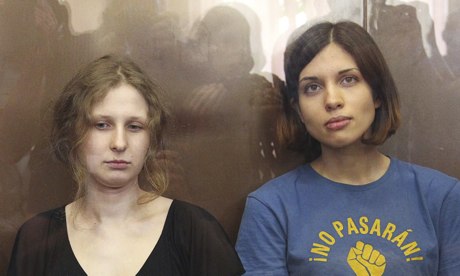By Ben Kopp
Impunity Watch Reporter, Europe
MOSCOW, Russia – Newly freed Russian musicians Maria Alyokhina and Nadezhda Tolokonnikova have declared to shift their work from Pussy Riot to human rights.

Pussy Riot band members Maria Alyokhina and Nadezhda Tolokonnikova recently served 21 months of a two-year sentence for “hooliganism.” On 23 December 2013, Russia released both members on amnesty.
Except for prison-acquired cigarette habits, no signs suggest that the women’s spirits are broken from their time served. Together, they hope to abolish Moscow’s neo-Gulag prison system.
In a 27 December 2013 media conference, the women declared that they will not continue Pussy Riot’s music project. Instead, Alyokhina and Tolokonnikova will become crusaders for prison reform, through their new human rights group, “Rights Zone.”
“For us, the punk prayer in the Christ the Savior Cathedral is not very important anymore,” said Tolokonnikova. “We are different people now. We lived through a long life in prison. It is a totally different reality from the one you live. And this common experience unites us now much more than our joint participation in the punk prayer in the Christ the Savior Cathedral.”
“Imagine,” said Alyokhina, “that at six this morning you were free: you could go where you want, say what you want, eat what you want. Then you were suddenly arrested; slung in a holding cell, and you were told to strip naked, bend over, then squat. So you’re standing there, naked, utterly helpless. And that’s how your journey to prison begins. It is the first thing you see. And it is legal.”
Alyokhina and Tolokonnikova hope to create Rights Zone in close “ideological and conceptual” cooperation with other public figures were also released on amnesty, such as opposition leader Aleksey Navalny and former oil tycoon Mikhail Khodorkovsky. Indeed, in a statement that they want Russian President Vladimir Putin out of office, they backed Khodorkovsky for President.
“For us, [Khodorkovsky] is important, because he’s a very strong person, a very tough person, and an incredible human being who went through a much tougher and much longer prison experience than we did,” said Tolokonnikova. “And that’s why he’s very valuable for us. He will work in the field of human rights protection in prisons, and that’s why we have to count on him.”
Nevertheless, while the former band members do not have the funds to create Rights Zone on their own, they have refused to ask Navalny or Khodorkovsky for sponsorship. Instead, the women plan to raise money by crowdfunding, which is a fundraising method commonly used by activists and artists asking for public donations via the internet.
With several controversial public figures released from Russian prisons on amnesty, only time will tell how successful any of them can be in political reformation, or whether new attempts could place them back in Russian prisons.
For further information, please see:
Telegraph – We Still Want to Cast Vladimir Putin out, Say Freed Pussy Riot Members – December 28, 2013
RadioFreeEurope RadioLiberty – Pussy Riot Members Want Khodorkovsky for President – December 27, 2013
Rolling Stone – Pussy Riot Unveil Plans for Human Rights Organization – December 27, 2013
RT – Pussy Riot Abandons ‘Brand,’ Will Form Human Rights Group – December 27, 2013


